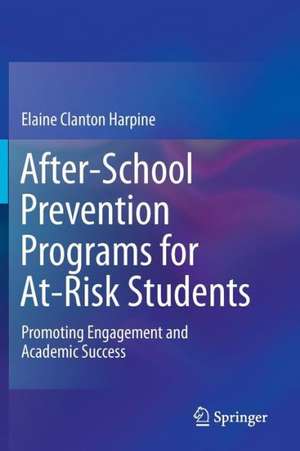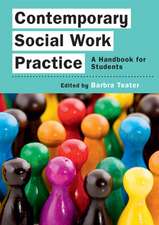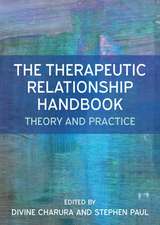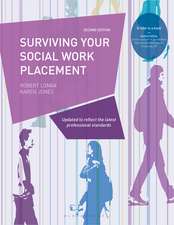After-School Prevention Programs for At-Risk Students: Promoting Engagement and Academic Success
Autor Elaine Clanton Harpineen Limba Engleză Paperback – 7 noi 2014
Among the topics covered:
- Organizing a group-centered after-school program.
- Combining learning and counseling into one curriculum.
- The role of motivation in an ongoing year-long program.
- Group process, self-efficacy, cohesion: applying the principles of change.
- Interaction in a year-long program.
- Solving problems and conflicts.
| Toate formatele și edițiile | Preț | Express |
|---|---|---|
| Paperback (1) | 380.07 lei 6-8 săpt. | |
| Springer – 7 noi 2014 | 380.07 lei 6-8 săpt. | |
| Hardback (1) | 387.38 lei 6-8 săpt. | |
| Springer – 12 iun 2013 | 387.38 lei 6-8 săpt. |
Preț: 380.07 lei
Nou
Puncte Express: 570
Preț estimativ în valută:
72.72€ • 75.75$ • 60.63£
72.72€ • 75.75$ • 60.63£
Carte tipărită la comandă
Livrare economică 28 martie-11 aprilie
Preluare comenzi: 021 569.72.76
Specificații
ISBN-13: 9781493923182
ISBN-10: 1493923188
Pagini: 134
Ilustrații: XX, 134 p.
Dimensiuni: 155 x 235 x 12 mm
Greutate: 0.23 kg
Ediția:2013
Editura: Springer
Colecția Springer
Locul publicării:New York, NY, United States
ISBN-10: 1493923188
Pagini: 134
Ilustrații: XX, 134 p.
Dimensiuni: 155 x 235 x 12 mm
Greutate: 0.23 kg
Ediția:2013
Editura: Springer
Colecția Springer
Locul publicării:New York, NY, United States
Public țintă
Professional/practitionerCuprins
Preface.- Easy Reference Guide to Group-Centered Learning Center Interventions.- Chapter 1: Organizing an After-School Program.- Chapter 2: The Group-Centered Approach.- Chapter 3: Combining Learning and Counseling into One After-school Program.- Chapter 4: The Role of Motivation in an Ongoing Year-long Program.- Chapter 5: Group Process, Self-Efficacy, and Cohesion: Applying the Principles of Change.- Chapter 6: Interaction in a Year-long Program.- Chapter 7: Solving Conflicts and Problems.- Chapter 8: After-School Programs and the School Mission.
Recenzii
"This text is scholarly yet reader-friendly. It is written without jargon and addresses major issues which arise while working with an at risk population. Additionally, it effectively addresses multiple facets of group cohesion, cultural needs, multiple teaching strategies, along with many problems solving skills ... This book is especially helpful for the new professional or those just beginning to work in group settings."
Kelly Devinney
The Group Psychologist
The Newsletter of the Society of Group Psychology and Group Psychotherapy
Kelly Devinney
The Group Psychologist
The Newsletter of the Society of Group Psychology and Group Psychotherapy
Notă biografică
Elaine Clanton Harpine, Ph.D., is a motivational psychologist specializing in group-centered motivational program design. She has 41 years experience designing and conducting motivational prevention programs for children and youth. Dr. Clanton Harpine earned her doctorate in Educational Psychology, Counseling from the University of Illinois, Urbana-Champaign.
Dr. Clanton Harpine has published 14 nonfiction books, including Prevention Groups (2013), Group-Centered Prevention Programs for At-Risk Students (2011), Group Interventions in Schools: Promoting Mental Health for At-Risk Children and Youth (2008). And No Experience Necessary! which received an Award of Excellence in 1995 and was selected as one of the top five children’s books in its class. Other published children’s writings include a two volume series entitled, Come Follow Me, in 2001, a three-volume family series completed in 2003, a youth book in 1989 along with numerous articles for teenagers on peer pressure, coping with failure, alcohol abuse, parents, suicide, and more recently, articles on using group-centered interventions in the schools. Other published writings include a series on Erasing Failure in the Classroom, a series of ready-to-use group-centered program packets: Vol. 1, the Camp Sharigan program (2nd ed., 2010), Vol. 2, Vowel Clustering (2010), and Vol. 3, the Reading Orienteering Club (2013).
Dr. Clanton Harpine has been interviewed on local early morning TV and radio concerning her workshop "Communication for Married Couples" and has been interviewed on local university radio concerning her work with inner-city children.
Her research for the past twelve years has focused on using group-centered interventions with at-risk readers. Dr. Clanton Harpine designed the motivational reading program called, Camp Sharigan, which she has used extensively in her workand research. She also designed the Reading Orienteering Club after-school prevention program and 4-Step Method for teaching at-risk children to read. Her research with these programs has been published in psychological journals and reported through presentations at the American Psychological Association's annual conventions.
In recent years, Dr. Clanton Harpine has been teaching Group Therapy and Counseling, Lifespan Development, and Human Growth and Development at the University of South Carolina Aiken and is continuing her research with group-centered prevention. She is the editor for the "Prevention Corner" column which appears quarterly in The Group Psychologist. She was selected for inclusion in Who’s Who of American Women, 2006-2013 for her work with children in inner-city neighborhoods and at-risk communities.
Dr. Clanton Harpine has published 14 nonfiction books, including Prevention Groups (2013), Group-Centered Prevention Programs for At-Risk Students (2011), Group Interventions in Schools: Promoting Mental Health for At-Risk Children and Youth (2008). And No Experience Necessary! which received an Award of Excellence in 1995 and was selected as one of the top five children’s books in its class. Other published children’s writings include a two volume series entitled, Come Follow Me, in 2001, a three-volume family series completed in 2003, a youth book in 1989 along with numerous articles for teenagers on peer pressure, coping with failure, alcohol abuse, parents, suicide, and more recently, articles on using group-centered interventions in the schools. Other published writings include a series on Erasing Failure in the Classroom, a series of ready-to-use group-centered program packets: Vol. 1, the Camp Sharigan program (2nd ed., 2010), Vol. 2, Vowel Clustering (2010), and Vol. 3, the Reading Orienteering Club (2013).
Dr. Clanton Harpine has been interviewed on local early morning TV and radio concerning her workshop "Communication for Married Couples" and has been interviewed on local university radio concerning her work with inner-city children.
Her research for the past twelve years has focused on using group-centered interventions with at-risk readers. Dr. Clanton Harpine designed the motivational reading program called, Camp Sharigan, which she has used extensively in her workand research. She also designed the Reading Orienteering Club after-school prevention program and 4-Step Method for teaching at-risk children to read. Her research with these programs has been published in psychological journals and reported through presentations at the American Psychological Association's annual conventions.
In recent years, Dr. Clanton Harpine has been teaching Group Therapy and Counseling, Lifespan Development, and Human Growth and Development at the University of South Carolina Aiken and is continuing her research with group-centered prevention. She is the editor for the "Prevention Corner" column which appears quarterly in The Group Psychologist. She was selected for inclusion in Who’s Who of American Women, 2006-2013 for her work with children in inner-city neighborhoods and at-risk communities.
Textul de pe ultima copertă
After-School Prevention Programs for At-Risk Students offers professionals a detailed framework for developing and enhancing after-school programs. Emphasizing a prevention focus and a group-centered interactive approach, the book's year-long model combines education and counseling, incorporating key therapeutic objectives to foster academic and behavior skills and reduce problems in and outside class. Practical step-by-step guidelines for creating and implementing programs include clear rationales, instructive design and case examples, and ready-to-use interventions. The author also provides guidance on developmental, gender, and cultural considerations, the challenges of maintaining progress over the course of the school year, and the handling of severe learning and emotional problems.
Among the topics covered:
Among the topics covered:
- Organizing a group-centered after-school program.
- Combining learning and counseling into one curriculum.
- The role of motivation in an ongoing year-long program.
- Group process, self-efficacy, cohesion: applying the principles of change.
- Interaction in a year-long program.
- Solving problems and conflicts.
Caracteristici
Provides theoretical and research bases for designing after-school programs that ensure academic success for at-risk students Features instructive case examples and evidence-based group-centered interventions Offers observational exercises to assist readers in gaining a deeper understanding of how group process works Shows how after-school gains translate into improved classroom performance and reduced dropout rates Includes supplementary material: sn.pub/extras
















